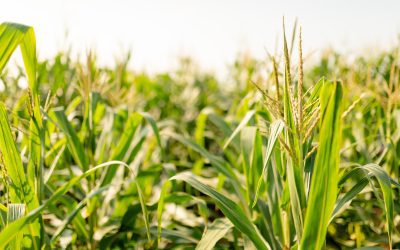Andretti Global hosts annual High Performance Low Carbon Liquid Fuels Summit
Posted: May 6, 2024
Category:
ICGA, ICGA Press Releases, ISA, ISA Press Releases, Market Development, Membership and Policy, News, Press Releases, Sustainability
INDIANAPOLIS, Ind. (May 6, 2024) — An exciting new partnership – appropriate for the month of May in Indianapolis – highlighted the annual High Performance Low Carbon Liquid Fuels Summit on May 1-2.

Hosted by the Indiana Soybean Alliance Membership & Policy Committee (M&P) and the Indiana Corn Growers Association (ICGA), the Summit brought biofuels industry stakeholders, retail fuel business owners and farmers to the Andretti Global headquarters in Indianapolis. A variety of speakers shared details about the opportunities for soybean-based biodiesel and corn-based ethanol fuels. Legislative efforts to assist these industries were covered, as well.
In an announcement made a couple weeks prior to the Summit, Andretti IndyCar became the newest members of the B20 Club of Indiana, which is a collaboration between ISA and the American Lung Association that showcases exceptional green fleets that use biodiesel blends of 20 percent or higher in Indiana. Andretti IndyCar is also using its platform to highlight Indiana corn farmers and corn products through driver Marco Andretti’s Indy 500 program.
“I’m excited about this partnership that’s coming online in its first year,” said Alex Moeller, Senior Director of Strategic Partnerships at Andretti IndyCar and Andretti Global. “Committing to the state of Indiana, we wanted a partnership with the Indiana Corn Marketing Council (ICMC) and the Indiana Soybean Alliance (ISA) knowing there are 20,000 farmers here that really drive the state’s economy. … As much as we can, we use renewable diesel through our IndyCar transporters as we go across the country. We have a few races in California now. So anytime we fill up our trucks there, it’s biodiesel. We’re trying to make this a pillar of our sustainability initiatives. This partnership with the B20 Club of Indiana really aligns well with what we’re doing from a sustainability standpoint and also from an Indiana standpoint. I’m excited to see where this goes in the next couple of years as we continue to grow.”

Helena Jette, Biofuels Director for ISA, ICMC and ICGA, added that she hopes more transportation fleets, perhaps more racing teams, will follow the example of Andretti IndyCar. “Andretti is the first B20 Club of Indiana member that is within the racing community, and it has a brand name behind it that is very recognizable,” she said. “Alex and his team here at Andretti are leaders in this sport and may influence others in IndyCar.”
The Summit was sponsored by the Indiana Corn Marketing Council (ICMC) and Indiana Soybean

Alliance (ISA) checkoffs. ISA Chair Kevin Cox, a farmer from Brazil, Ind., said the state’s soybean checkoff program works diligently to develop new markets.
Biodiesel is a key checkoff effort, and the state now is home to the United States’ largest biodiesel facility, Louis Dreyfus in Claypool, Ind., which uses more than 300 million pounds of soybean oil to produce nearly 100 million gallons from Indiana soybeans. He said all partners in the supply chain must work and benefit for the industry to grow.
“Coordination is important for any business, and the biofuels business is no different,” Cox said. “The supply chain starts with farmers growing soybeans and corn as the feedstock for biodiesel and ethanol. We work closely with the biorefineries that buy our crops. The biorefineries work closely with the fuel retailers who sell the product to consumers. In between those steps are many levels of transportation and marketing and sales. If any of these steps break down, then the industry suffers. Events like this help us maintain good relationships with our partners in keeping this industry strong.”
ICMC President Tim Gauck, a Greensburg, Ind., farmer, said the state’s corn checkoff works on expanding ethanol opportunities. “ICMC’s vision is to be a catalyst for innovation and leadership for the Indiana grain industry,” he said. “Indiana has 15 ethanol plants, and almost half of our corn is converted into ethanol. Biofuels are positively serving Indiana’s economy, environment and local farmers. Our organizations are doing all they can to help fuel retailers take full advantage of the benefits of ethanol blends in their operations.”
The Summit included several panel discussions with biofuels experts from around the world. Some of these sessions included:

- The Big Picture: Navigating Infrastructure, Technical and Regulatory Environments – moderated by Kristy Moore, Principal Scientist for KMoore Consulting LLC with a panel featuring Jamey Cline, Christianson PLLP; Jeff Dzierzanowski, Source North America Corporation; Andy McConnell, Sheetz, Inc.; and Sam Peyton of Oneok.
- Ethanol and Biodiesel’s Role in Decarbonizing Light and Heavy Duty Markets – moderated by Mike Roeth of the North American Council for Freight Efficiency with a panel featuring Colin Huwyler, Optimus Technology; Dr. Greg Shaver, Purdue University; Juha Honkasalo, eFlexFuel Technology; and Kristy Moore.
- GTAP/ILUC/CORSIA/ICAO/GREET: Alphabet Soup in Carbon Scoring that Matters presented by Dr. Steffen Mueller, Ph.D, of the University of Illinois at Chicago.
- New Markets for Biofuels by Debnil Chowdhury and Juan Sacoto of S&P Global.
- Federal Policy, Politics and the 2024 Election: Crystal Ball Forecasts – moderated by Jordan Godwin, Oil Price Information Services with a panel featuring Geoff Moody, American Fuel and Petrochemical Manufacturers; David Cobb, Clean Fuels Alliance America; Chris Bliley, Growth Energy; and Jimmy Conde, Boyden Gray PLLC.
Advocating for more long-term opportunities for biofuels is a primary mission for M&P and ICGA. This year, the soybean and corn policy organizations have campaigned for year-round sales of higher blends of ethanol and a biodiesel fuel tax credit.
Steve Howell, Senior Director of Industry Affairs for ISA, ICMC and ICGA, interviewed the author of a state bill (HB1315) that would provide biofuel tax credits on the sale of blended ethanol, biodiesel and renewable diesel. The author, Rep. Craig Snow (R-Warsaw, Ind.), was joined by Sen. Brian Buchanan (R-Lebanon) to share the strategy for success in 2025.
Snow worked with Howell and a broad coalition of supporters to develop the bill this year with the understanding that it could not pass until 2025 because it changes tax law. Bills affecting tax laws can only get changed every other year in the Indiana General Assembly. Both lawmakers are pleased with the bill’s progress and believe groundwork has been laid for success in 2025.

ICGA is pleased with the U.S. Environmental Protection Agency’s (EPA) recent waiver to allow summer sales of E15 (a 15 percent blend of ethanol with petroleum). However, the policy group is seeking a more permanent, legislative solution instead of annual waivers.
“Along with the state biofuel tax incentive (HB1315), we are also working toward year-round access to E15,” said ICGA President Chris Cherry, a farmer from Hancock County, Ind. “While the president’s administration has waived E15 restrictions the last few summers, it is not a sustainable, long-term solution for the marketplace. The Clean Air Act’s volatility limits need to be updated to reflect today’s fuel marketplace and recognize the benefits of E15. I look forward to opportunities to share this priority with federal lawmakers this summer during Hill visits.”
Sustainable Aviation Fuel (SAF) was a new topic at the Summit. SAF is an earth-friendly jet fuel made from soybeans, corn and other renewable feedstocks. From the crop fields where this fuel begins to the airplanes they power, SAF can reduce lifecycle carbon emissions by up to 80 percent when compared to traditional jet fuel. SAF will allow passenger and freight airlines to seek federal tax benefits by achieving a lower carbon index (CI) score. Anthony Gregory, COO of Renewable Ventures for Southwest Airlines discussed how they are open to multiple pathways to produce SAF and reach a company goal of net zero carbon emissions by 2050.

Low CI scores have become important to biofuels producers and consumers after the Inflation Reduction Act of 2022. That law charged the U.S. Department of Energy (DOE) to create parameters to measure the amount of carbon-based energy used to produce the feedstock for biofuels. The lower the CI score, the greater the tax credit for a consumer or retailer of biofuels.
Lowering CI scores and discussions with the DOE to change the parameters of calculating those scores were themes at the Summit. Jette led an SAF panel talk that included Indianapolis Airport Authority Director of Environment and Sustainability Todd Cavender; Commercial Aviation Alternative Fuels Initiative Project Director Tim Hughes, Gevo Director of Federal Government Affairs Kathy Bergren and Rabobank Vice President of Grains and Oilseeds Owen Wagner.
Cavender said global shipping company FedEx has the company’s second largest hub in the United States at Indianapolis International Airport. He added the airport can assist companies like FedEx and passenger airlines by having SAF available for refueling.
Jette asserted, though, that the primary efforts for ICMC, ISA and ICGA are to promote the benefits and create new opportunities for biodiesel, renewable diesel and ethanol. ICGA President Chris Cherry stated that the Summit highlights the organizations’ partners.

“We are happy to recognize and appreciate the work of our partners in the ethanol and biodiesel industries,” Cherry said. “Ethanol is more than quality fuel or fuel additive. It’s a performance-enhancing, low carbon, octane source made from renewable corn. Biodiesel is a clean-burning alternative fuel that can be used in existing, unmodified diesel engines. Both biofuels are critical for a sustainable, clean energy future.”
Many sponsors also added to the success of this Summit. The gold sponsors included the American Lung Association, the Indiana Ethanol Producers Association, Family Express, Valero, First Farmers Bank & Trust, the B20 Club, ISA and ICMC. Silver sponsors were Growth Energy and the National Corn Growers Association. The Bronze sponsors were Corteva Agriscience, the Indiana Food & Fuel Association, Indigenous Energy, eFlexFuel Technology, Central Indiana Ethanol and Chevron Renewable Energy Group. Also sponsoring various aspects of the event were eFlexFuel Technology (lunch); S&P Global (breakfast); Indiana Food & Fuel Association (all breaks) and Cardinal Ethanol (show program).
Contact: Dave Blower Jr. at 317-644-0980; dblower@indianasoybean.com
About Indiana Soybean Alliance Membership and Policy Committee: The ISA Membership and Policy Committee works to enhance the viability of Indiana soybean farmers through the advocacy and promotion of state and federal policies. ISA Membership and Policy Committee is led by members of the Indiana Soybean Alliance farmer board who are charged with directing advocacy efforts on behalf of approximately 600 dues-paying members. Learn more here.
About Indiana Corn Growers Association: The Indiana Corn Growers Association works with state and federal governments to develop and promote sound policies that benefit Indiana corn farmers. The ICGA consists of nine farmer-directors who provide leadership to the organization on behalf of more than 700 members statewide. Learn more here.
This communication was NOT funded with Indiana corn and soybean checkoff dollars.



